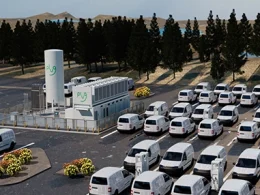Numerous innovative green vehicle technology projects, including ultra-lightweight vehicles, zero-emission buses, and advanced battery technologies, are set to benefit from £88 million ($116 million) in joint funding from the UK government and industry, bringing the country closer to its net-zero goals.
UK Minister for Industry and Decarbonisation, Sarah Jones is set to announce the funding awarded to 46 groundbreaking projects, including initiatives like the development of electric trucks for the NHS and Royal Mail, e-motorcycles, and wireless charging solutions.
This investment is a strong endorsement of the UK’s automotive industry, expected to create thousands of skilled green jobs across the nation as part of the government’s mission to drive economic growth.
On Tuesday, The Minister will visit two successful applicants under the Advanced Propulsion Centre UK’s (APC) Collaborative R&D competition: Protean Electric and Gordon Murray Group. Protean Electric is developing new power-electronics products, while Gordon Murray Group is creating an ultra-lightweight vehicle platform. These projects represent vital technologies supporting the UK’s shift towards zero-emission vehicles, with a combined investment of £22.5 million (USD 29.7 million), including £11 million ($14.5 million) from the government. Together, they are projected to save nearly 13 million tonnes of CO2 and safeguard nearly 1,000 jobs.
Jones said, “Labour is committed to boosting the jewel in the crown of our manufacturing base – the automotive industry. Working in partnership with industry this funding will drive innovation and propel the development of next-generation zero emission vehicle technologies. From Royal Mail trucks delivering our post to cleaner, greener bus journeys, this funding will back projects that will lower emissions across the country, while also supporting skilled jobs.”
Andrew Whitehead, Chief Executive Officer of Protean Electric said, “We are thrilled that project PULSE has been selected by the APC and the new Government, as it supports Protean to continue to lead electric vehicle innovation from our UK development centre. We are delighted to welcome Minister Jones and would like to thank her for the new Government’s continued commitment towards net-zero, and look forward to engaging further on these topics in the future.”
Jean-Philippe Launberg, Gordon Murray Group Strategy & Business Director said, “The Gordon Murray Group and our R&D partners feel privileged to receive – through Innovate UK and APC – Government support for the M-LightEn Project and be trusted with the development and industrialisation of leading-edge technologies to make cars significantly more energy efficient to build and run, contributing to the UK’s decarbonisation.”
The £88 million funding includes £44.5 million from the government, matched by £43.5 million from the automotive industry and is being awarded through the APC. This investment covers various projects, including collaborative R&D, battery and motor technology studies, and initiatives by SMEs focused on zero-emission solutions.
Ian Constance, Chief Executive Officer APC said, “Congratulations to all the companies awarded funding in this latest round of competitions facilitated by the Department for Business and Trade and industry via the APC. From collaborative projects to further advance the UK’s excellence in automotive production, to fast-start demonstrators delivering cutting-edge technology in a short period, through to our award-winning SME programme, it’s important we continue to show that the automotive sector is vital to the country’s net-zero goals and future economic growth, further evidencing that the UK is a highly investable opportunity.”
Other successful projects, across five competitions, include eight collaborative R&D projects, seven Automotive Transformation Fund (ATF) Feasibility Studies looking into battery and motor technologies, 11 projects aiming to rapidly develop automotive products, 14 micro-businesses, SMEs and start-ups specialising in zero emission technologies which tackle transport decarbonisation and 6 projects exploring zero tailpipe emission vehicle technologies within the niche vehicle sector.
A report from the Faraday Institution predicts that the UK will need battery capacity equivalent to six gigafactories by 2030, with the potential to support 270,000 jobs in the electric vehicle and battery industries by 2040.





















